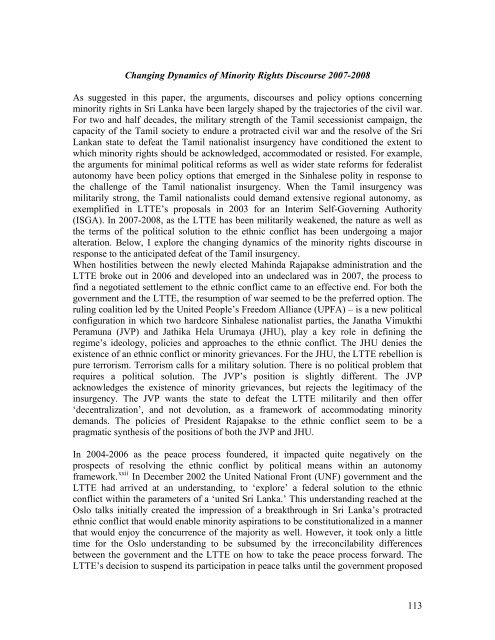Living on the Margins. Minorities in South Asia - EURAC
Living on the Margins. Minorities in South Asia - EURAC
Living on the Margins. Minorities in South Asia - EURAC
- TAGS
- minorities
- eurac
- www.eurac.edu
Create successful ePaper yourself
Turn your PDF publications into a flip-book with our unique Google optimized e-Paper software.
Chang<strong>in</strong>g Dynamics of M<strong>in</strong>ority Rights Discourse 2007-2008<br />
As suggested <strong>in</strong> this paper, <strong>the</strong> arguments, discourses and policy opti<strong>on</strong>s c<strong>on</strong>cern<strong>in</strong>g<br />
m<strong>in</strong>ority rights <strong>in</strong> Sri Lanka have been largely shaped by <strong>the</strong> trajectories of <strong>the</strong> civil war.<br />
For two and half decades, <strong>the</strong> military strength of <strong>the</strong> Tamil secessi<strong>on</strong>ist campaign, <strong>the</strong><br />
capacity of <strong>the</strong> Tamil society to endure a protracted civil war and <strong>the</strong> resolve of <strong>the</strong> Sri<br />
Lankan state to defeat <strong>the</strong> Tamil nati<strong>on</strong>alist <strong>in</strong>surgency have c<strong>on</strong>diti<strong>on</strong>ed <strong>the</strong> extent to<br />
which m<strong>in</strong>ority rights should be acknowledged, accommodated or resisted. For example,<br />
<strong>the</strong> arguments for m<strong>in</strong>imal political reforms as well as wider state reforms for federalist<br />
aut<strong>on</strong>omy have been policy opti<strong>on</strong>s that emerged <strong>in</strong> <strong>the</strong> S<strong>in</strong>halese polity <strong>in</strong> resp<strong>on</strong>se to<br />
<strong>the</strong> challenge of <strong>the</strong> Tamil nati<strong>on</strong>alist <strong>in</strong>surgency. When <strong>the</strong> Tamil <strong>in</strong>surgency was<br />
militarily str<strong>on</strong>g, <strong>the</strong> Tamil nati<strong>on</strong>alists could demand extensive regi<strong>on</strong>al aut<strong>on</strong>omy, as<br />
exemplified <strong>in</strong> LTTE’s proposals <strong>in</strong> 2003 for an Interim Self-Govern<strong>in</strong>g Authority<br />
(ISGA). In 2007-2008, as <strong>the</strong> LTTE has been militarily weakened, <strong>the</strong> nature as well as<br />
<strong>the</strong> terms of <strong>the</strong> political soluti<strong>on</strong> to <strong>the</strong> ethnic c<strong>on</strong>flict has been undergo<strong>in</strong>g a major<br />
alterati<strong>on</strong>. Below, I explore <strong>the</strong> chang<strong>in</strong>g dynamics of <strong>the</strong> m<strong>in</strong>ority rights discourse <strong>in</strong><br />
resp<strong>on</strong>se to <strong>the</strong> anticipated defeat of <strong>the</strong> Tamil <strong>in</strong>surgency.<br />
When hostilities between <strong>the</strong> newly elected Mah<strong>in</strong>da Rajapakse adm<strong>in</strong>istrati<strong>on</strong> and <strong>the</strong><br />
LTTE broke out <strong>in</strong> 2006 and developed <strong>in</strong>to an undeclared was <strong>in</strong> 2007, <strong>the</strong> process to<br />
f<strong>in</strong>d a negotiated settlement to <strong>the</strong> ethnic c<strong>on</strong>flict came to an effective end. For both <strong>the</strong><br />
government and <strong>the</strong> LTTE, <strong>the</strong> resumpti<strong>on</strong> of war seemed to be <strong>the</strong> preferred opti<strong>on</strong>. The<br />
rul<strong>in</strong>g coaliti<strong>on</strong> led by <strong>the</strong> United People’s Freedom Alliance (UPFA) – is a new political<br />
c<strong>on</strong>figurati<strong>on</strong> <strong>in</strong> which two hardcore S<strong>in</strong>halese nati<strong>on</strong>alist parties, <strong>the</strong> Janatha Vimukthi<br />
Peramuna (JVP) and Jathika Hela Urumaya (JHU), play a key role <strong>in</strong> def<strong>in</strong><strong>in</strong>g <strong>the</strong><br />
regime’s ideology, policies and approaches to <strong>the</strong> ethnic c<strong>on</strong>flict. The JHU denies <strong>the</strong><br />
existence of an ethnic c<strong>on</strong>flict or m<strong>in</strong>ority grievances. For <strong>the</strong> JHU, <strong>the</strong> LTTE rebelli<strong>on</strong> is<br />
pure terrorism. Terrorism calls for a military soluti<strong>on</strong>. There is no political problem that<br />
requires a political soluti<strong>on</strong>. The JVP’s positi<strong>on</strong> is slightly different. The JVP<br />
acknowledges <strong>the</strong> existence of m<strong>in</strong>ority grievances, but rejects <strong>the</strong> legitimacy of <strong>the</strong><br />
<strong>in</strong>surgency. The JVP wants <strong>the</strong> state to defeat <strong>the</strong> LTTE militarily and <strong>the</strong>n offer<br />
‘decentralizati<strong>on</strong>’, and not devoluti<strong>on</strong>, as a framework of accommodat<strong>in</strong>g m<strong>in</strong>ority<br />
demands. The policies of President Rajapakse to <strong>the</strong> ethnic c<strong>on</strong>flict seem to be a<br />
pragmatic syn<strong>the</strong>sis of <strong>the</strong> positi<strong>on</strong>s of both <strong>the</strong> JVP and JHU.<br />
In 2004-2006 as <strong>the</strong> peace process foundered, it impacted quite negatively <strong>on</strong> <strong>the</strong><br />
prospects of resolv<strong>in</strong>g <strong>the</strong> ethnic c<strong>on</strong>flict by political means with<strong>in</strong> an aut<strong>on</strong>omy<br />
framework. xxii In December 2002 <strong>the</strong> United Nati<strong>on</strong>al Fr<strong>on</strong>t (UNF) government and <strong>the</strong><br />
LTTE had arrived at an understand<strong>in</strong>g, to ‘explore’ a federal soluti<strong>on</strong> to <strong>the</strong> ethnic<br />
c<strong>on</strong>flict with<strong>in</strong> <strong>the</strong> parameters of a ‘united Sri Lanka.’ This understand<strong>in</strong>g reached at <strong>the</strong><br />
Oslo talks <strong>in</strong>itially created <strong>the</strong> impressi<strong>on</strong> of a breakthrough <strong>in</strong> Sri Lanka’s protracted<br />
ethnic c<strong>on</strong>flict that would enable m<strong>in</strong>ority aspirati<strong>on</strong>s to be c<strong>on</strong>stituti<strong>on</strong>alized <strong>in</strong> a manner<br />
that would enjoy <strong>the</strong> c<strong>on</strong>currence of <strong>the</strong> majority as well. However, it took <strong>on</strong>ly a little<br />
time for <strong>the</strong> Oslo understand<strong>in</strong>g to be subsumed by <strong>the</strong> irrec<strong>on</strong>cilability differences<br />
between <strong>the</strong> government and <strong>the</strong> LTTE <strong>on</strong> how to take <strong>the</strong> peace process forward. The<br />
LTTE’s decisi<strong>on</strong> to suspend its participati<strong>on</strong> <strong>in</strong> peace talks until <strong>the</strong> government proposed<br />
113

















